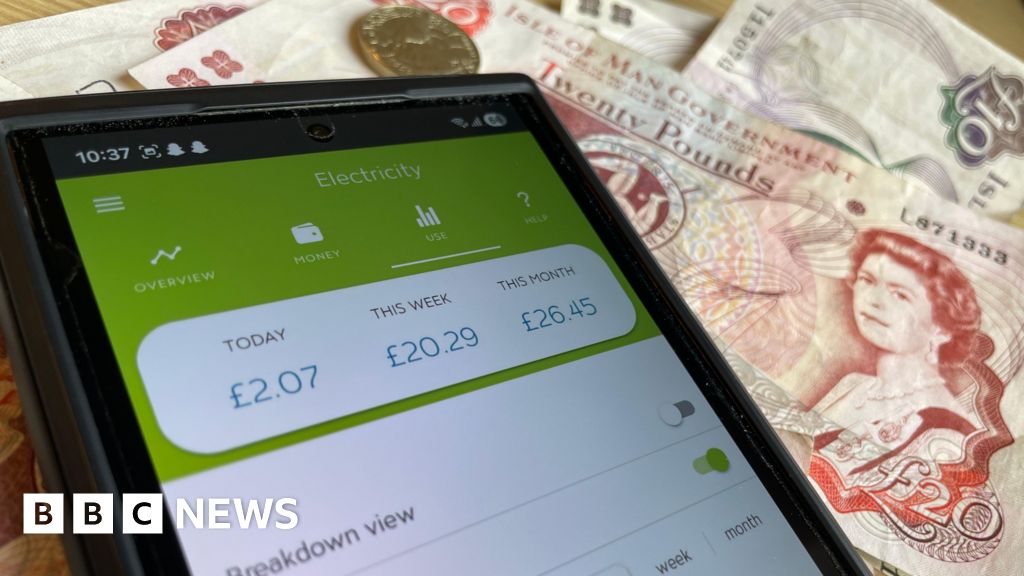Business
More workers needing food banks – Wolverhampton support group

BBC News, West Midlands
 Anna-Mhairi Kane
Anna-Mhairi KaneThe founder of a support group says she feels more working people and volunteers are facing “desperate times” amid the cost of living crisis.
During the pandemic, Leanne McDonald, from Wolverhampton, set up Simple Acts of Kindness in a bid to help people who were in difficult financial situations.
The group helps up to six or seven families every week across the city, Birmingham, and the Black Country, by distributing donated household items, including furniture and clothing, and acting as a signpost for other services.
Ms McDonald said she was seeing more people coming to them who were in employment, including full-time workers, seeking help.
Among them were teachers and nursing staff, many of whom were asking where they could access food banks.
“They’re highly skilled but unfortunately the wages just aren’t there…it was a surprise to me that many are struggling to feed their families,” she said.
“I feel that we are in quite desperate times at the moment.”
 Stuart Anderson
Stuart AndersonMs McDonald, who runs the charity alongside her full-time job at a training academy, said it was especially frustrating to her that teaching staff could not afford to pay for essentials like food and household goods.
“It’s really disheartening to see because we’re relying on these people to teach our children and provide care and support to families,” she added.
The rising cost of living also had an impact on the support group itself, Ms McDonald said, with volunteer numbers dropping from about 10 to three.
She said this was partly down to some taking on extra paid work after struggling with finances themselves.
Simple Acts of Kindness currently does not have a base and is mostly run from Ms McDonald’s family home, while she rents a storage space for donated items.
Despite the extra pressure from the demand and decreasing number of volunteers, Ms McDonald said she would persevere as the support was “still needed”.
“I’ve had to find a good balance – my family are really understanding,” she said.
“My children live in a house where we have constant people dropping items off or collecting items.”
In a bid to try and raise more funds to cover the group’s costs, Simple Acts of Kindness has organised a fun day, at the Golden Bar and Grill in Wolverhampton, on 30 August.
‘Breaking point’
Ms McDonald’s comments came after Citizens Advice warned people on the lowest incomes were “running out of options” in the face of rising bills.
A report from the Institute for Public Policy Research in March showed households in the lowest 10% for income spent about 41% of their earnings, after housing, on water, energy, broadband and car insurance.
That compared to 11% for those on middle incomes, with those in the top 10% of earners spending 5%.
Dame Clare Moriarty, chief executive of Citizens Advice, said: “For those on the lowest incomes, these unavoidable costs are already eating away at their finances, leaving their budgets stretched beyond breaking point.”
Business
Beyond oil: How US-Iran war & Middle East crisis may hit India’s economy – sector-wise impact explained – The Times of India

Beyond oil, the Middle East crisis has other implications for the Indian economy, especially if the US-Israel-Iran war continues for a long duration leading to major supply disruptions. In recent days, a series of missile and drone attacks have struck multiple energy and logistics installations across the Gulf region. These incidents have heightened concerns that shipments of oil and gas moving through the Strait of Hormuz – a vital artery for global energy trade – could face disruption.Between March 1 and March 3, important facilities in Saudi Arabia, Qatar, the United Arab Emirates and Oman came under attack. The situation has fueled concerns that the conflict could trigger a wider shock to global energy supplies.But beyond oil, it’s important to note that West Asia plays an important role in supplying India with essential commodities. In 2025, India’s imports from the region of approximately $98.7 billion included critical resources such as energy, fertilisers and industrial inputs.
1. Oil: Immediate risk
Petroleum is the most immediate area of exposure. In 2025, India sourced roughly $70 billion crude oil and petroleum products from West Asia.“Crude oil feeds India’s refineries, which produce petrol, diesel, aviation fuel and petrochemical feedstocks used across the economy. India has about 30 days of stocks, any prolonged disruption in shipments could quickly push up fuel prices, raising transport and logistics costs and feeding into inflation. Farmers would also feel the pressure through higher diesel prices for irrigation pumps and tractors,” says Ajay Srivastava, founder of Global Trade Research Initiative (GTRI).Also Read | Russian crude to rescue! Ships carrying Russia’s oil head to India amid Middle East supply shock: Report
2. LNG Supplies
Supplies of natural gas are also exposed to potential disruptions. In 2025, India sourced liquefied natural gas or LNG worth $9.2 billion from West Asia, which is around 68.4% of its total LNG imports. LNG is also a key input for fertilizer manufacturing units, gas-fired power plants and city gas distribution systems that provide compressed natural gas (CNG) for vehicles and piped gas for household cooking.Signs of this vulnerability have already emerged. Qatar’s Petronet LNG halted LNG deliveries to GAIL starting March 4, 2026 due to restrictions affecting vessel movement.
3. Risks to LPG
Liquefied petroleum gas (LPG) imports from West Asia were $13.9 billion in 2025, making up 46.9 % of India’s total LPG purchases. LPG continues to serve as the main cooking fuel for millions of households. With reserves covering only about two weeks of consumption, any interruption in supply could quickly impact the availability of cooking fuel.
4. Exposure in Fertiliser Supplies
India’s agricultural sector could also feel the impact through fertiliser imports, says GTRI in its report. In 2025, fertiliser purchases from West Asia stood at $3.7 billion. Any disruption in supplies during the crop cycle could lead to reduced fertilizer availability, increase the government’s subsidy burden and eventually push up food prices.Also Read | India’s energy security exposure to Middle East: How much oil, LPG, LNG reserves do we have?
5. Diamond Trade and Exports
India’s diamond export sector is also closely tied to supplies from the Gulf. Diamonds of around $6.8 billion were imported from the Middle East in 2025, which is 40.6% of its total imports of these stones. Rough diamonds are in turn processed in India’s cutting and polishing centres, especially in Gujarat’s Surat, before being exported to international markets as polished gems. Any interruption in the flow of raw diamonds could slow manufacturing activity and have an impact on employment within the jewellery industry.
6. Industrial Raw Material Supplies
A number of industrial inputs sourced from the Gulf are also crucial for India’s manufacturing sector. India bought polyethylene polymers of around $1.2 billion from West Asia in 2025. Polyethylene is widely used in products such as packaging materials, plastic piping, storage containers, consumer goods and agricultural films used in irrigation systems.
7. Construction-Related Materials
India’s construction industry also relies heavily on mineral imports from the region. In 2025, the country imported limestone worth $483 million from West Asia. Limestone is a key ingredient in cement production, and hence any shortage could raise the cost of cement, thereby possibly slowing infrastructure development.
8. Metals Supply Chains
Supply links with West Asia also extend to the metals sector. India imported direct reduced iron of around $190 million from the Middle East region in 2025. Additionally, the country sourced copper wire worth $869 million from West Asia. Copper wire is widely used in power transmission networks, electrical machinery and renewable energy infrastructure.As GTRI notes: Together, these figures highlight how closely India’s economy is tied to West Asian supply chains. “If disruptions to shipping through the Strait of Hormuz continue beyond a week, the effects could quickly spread from energy markets to fertiliser supplies, manufacturing inputs, construction materials and export industries such as diamonds. What begins as a regional conflict could rapidly evolve into a broader supply shock for the Indian economy,” the GTRI report concludes.
Business
Aviva flags potential for Iran conflict to send claims costs rising

The boss of insurer Aviva has cautioned that a lengthy conflict in the Middle East could send the cost of vehicle parts and repairs surging in an echo of the aftermath seen after Russia’s invasion of Ukraine.
Chief executive Amanda Blanc said the group has seen limited claims so far relating to the US-Israel war with Iran, but flagged the potential for claims costs to jump if supply chains are badly disrupted for a long time.
She said: “We have a good case study on this in terms of the Ukraine situation back in 2022 and the impact on the supply chain, which had an inflationary impact on vehicle parts and replacement vehicles.
“Obviously, if this goes on for a prolonged period of time, we would expect that this could have some impact, but to speak about this from an Aviva perspective, we are very well placed to manage that with our supply chain and our owned garage network.”
Ms Blanc added: “We will take action as necessary to make sure we look after our customers and price accordingly for any new inflationary impact.”
She said there had been “very limited” travel claims so far.
Ms Blanc added: “We have had calls from customers asking about whether they should travel and those sorts of things, and we are pointing them to the Foreign Office guidance on that.”
Full-year results from Aviva on Thursday showed annual earnings leaped 25% higher, while the firm also announced it was resuming share buybacks as it continues to benefit from its £3.7 billion takeover of Direct Line.
The group unveiled an earnings haul of £2.2 billion for 2025, up from £1.8 billion in 2024, including a £174 million contribution from Direct Line, helping the group hit its financial targets a year early.
Aviva unveiled a £350 million share buyback after putting these on hold due to the Direct Line deal, which completed last year.
Ms Blanc cheered an “outstanding performance”.
She said: “We have transformed Aviva over the last five years and whilst we have made significant progress, there is so much more to come.”
Artificial intelligence (AI) is also a big area of focus for the firm, according to Ms Blanc.
“We have clear strengths in artificial intelligence which are creating major opportunities to transform claims, underwriting and customer experience,” she said.
Business
Isle of Man electricity, water and sewage prices set to rise

Electricity prices on the Isle of Man will rise by 1.5%, while water and sewage goes up by 2.9%.
Source link
-

 Politics1 week ago
Politics1 week agoWhat are Iran’s ballistic missile capabilities?
-

 Business6 days ago
Business6 days agoIndia Us Trade Deal: Fresh look at India-US trade deal? May be ‘rebalanced’ if circumstances change, says Piyush Goyal – The Times of India
-

 Business7 days ago
Business7 days agoAttock Cement’s acquisition approved | The Express Tribune
-

 Business1 week ago
Business1 week agoHouseholds set for lower energy bills amid price cap shake-up
-

 Politics1 week ago
Politics1 week agoUS arrests ex-Air Force pilot for ‘training’ Chinese military
-

 Fashion7 days ago
Fashion7 days agoPolicy easing drives Argentina’s garment import surge in 2025
-

 Sports6 days ago
Sports6 days agoLPGA legend shares her feelings about US women’s Olympic wins: ‘Gets me really emotional’
-

 Fashion7 days ago
Fashion7 days agoTexwin Spinning showcasing premium cotton yarn range at VIATT 2026







